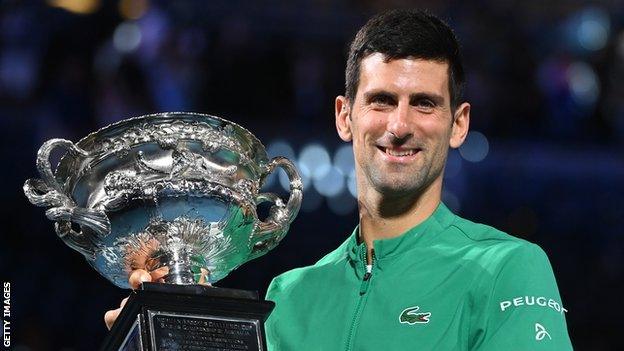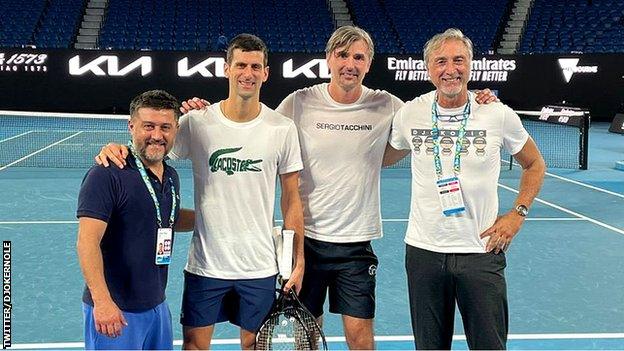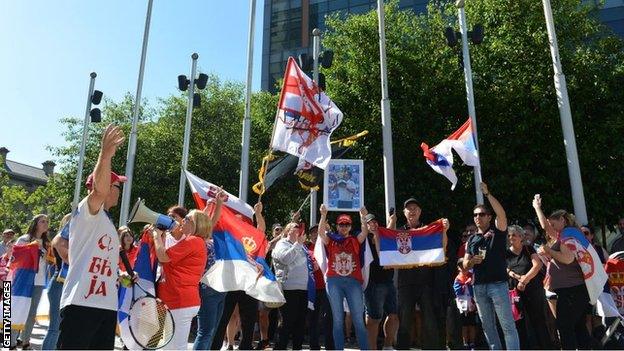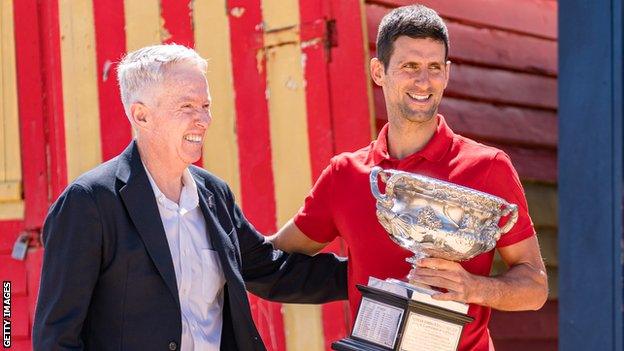Novak Djokovic: What's next for Grand Slam champion after Australia row?
- Published

No player has won more Australian Open men's titles than Novak Djokovic, who lifted the trophy for a ninth time in 2021
Novak Djokovic has been given the chance to win a record 21st Grand Slam men's singles title at next week's Australian Open after the cancellation of his visa by the nation's border officials was overturned.
Reversing that decision - and being allowed into the country to defend his title in Melbourne - has been the primary concern for the 34-year-old Serb.
Australia's immigration minister Alex Hawke still has powers to re-cancel Djokovic's visa and deport him, with a government spokesman saying he is still "thoroughly considering the matter".
Whatever happens, the situation also raises further questions for Djokovic, plus other tennis players who are reluctant to be vaccinated, for the season ahead.
Will other countries stop Djokovic entering if he is not vaccinated? Could it prevent him playing in the other Grand Slam tournaments?
And what effect will the saga have on the defending champion's physical and mental preparation as he chases a record-extending 10th men's title at Melbourne Park?
Is Djokovic going to be ready to play?
Djokovic didn't commit a crime, he just wants to play tennis - Becker speaks to BBC Breakfast
Djokovic's first-round match is scheduled for Monday or Tuesday.
After having his visa revoked, he chose to remain in Australia to fight his case. It meant he had to stay for four nights in an immigration detention hotel with a notorious reputation.
Djokovic was allowed to leave the hotel on Monday evening after the appeal hearing was ruled in his favour.
Now he must catch up on several days without practice and, most likely, with little exercise in a facility where rooms have been described as "coffins".
Ros Atkins on... questions that remain for Djokovic
Within hours of winning his appeal hearing, Djokovic posted an image on Twitter of him training on Rod Laver Arena.
Although the lack of physical preparation will be a concern, Djokovic has won Grand Slam titles before without having played a warm-up tournament.
The circumstances here, though, are wildly different. People will also question what effect the situation has had on him mentally.
The scrutiny and furore is not going to suddenly disappear.
Djokovic is likely to face a lot of questions about the timeline of the events, the positive result he returned and, even though it has been reduced to a sideshow for now, the tennis.
Some will have little sympathy and say any knock-on effects have been created by Djokovic himself: firstly, by remaining unvaccinated and secondly, deciding to fight the case rather than leaving Australia voluntarily.

Djokovic posted a photo on Twitter of himself and his team following a practice session on Rod Laver Arena, hours after he left the immigration detention hotel
What reception will he receive from fans and fellow players?
If Djokovic does take to the court, it will be fascinating to hear and see the reaction of the fans at Melbourne Park.
"I love you each year more and more. The love affair keeps going," he told the Rod Laver Arena crowd after winning the title last year.
The romance has turned sour. Whether it has gone past the point of reconciliation remains to be seen as Djokovic - not for the first time - finds himself needing to win over a crowd.
Initially there was a lot of anger towards Djokovic from Australians and, although plenty still remains, some of that fury has moved towards the Australian government for its handling of the fiasco.
Those tennis fans attending the matches, it should be noted, must have been vaccinated themselves in order to attend.

Supporters of Novak Djokovic protested outside the courthouse throughout proceedings
Former world number five Kevin Anderson said the reaction among the players to Djokovic's case has been "a mixed bag".
The South African recalled a conversation with another player - who he did not name but said was "one of the best in the world" - about his "difficult time" getting the coronavirus vaccination.
"His whole life he has had sensitivities to vaccines and had to travel a lot to get it. But he made the effort," Anderson, who was beaten by Djokovic in the 2018 Wimbledon final, told BBC Radio 5 Live.
"It's tough to listen to some of these stories and then hear Novak's stance, in the way he hasn't been vaccinated, and his sequence of events of when apparently he tested positive.
"It raises a few questions for me and some players see it the same way."
Anderson also said there was "no doubt" it would be a better tournament with Djokovic playing. Veteran Spanish player Feliciano Lopez agreed, adding "nobody wants a Grand Slam to be played without the number one in the world".
What does this mean for his relationship with Australia?
Djokovic has long spoken of his affection for Australia and the self-marketed 'Happy Slam' held there.
Winning a record nine Australian Open men's titles is largely why. Last year he described Melbourne Park, where there is always a large band of Serbian support, as "feeling like home".
Tennis Australia chief executive Craig Tiley has built a strong relationship with Djokovic and, speaking before the Serb landed in Melbourne, he denied accusations the governing body had helped the player obtain the exemption.
"Any person who met those conditions has been allowed to come in. There's been no special favour. There's been no special opportunity granted to Novak," Tiley told Channel Nine television.

Australian Open tournament director Tiley and Djokovic have long had a warm relationship
In the meantime, there were claims Tennis Australia had been told by the Australian government in November that border officials would not accept a previous case of Covid as a valid exemption reason to be unvaccinated.
Last week, Acting Victorian Premier Jacinta Allan claimed Tiley and Tennis Australia did not inform the state government about this guidance from the federal government.
Amid criticism of his role in the saga, Tiley did not make a public statement until four days after Djokovic's arrival.
On Sunday, Tiley said the confusion had arisen from "conflicting information" in a "changing environment". He denied Tennis Australia had deliberately misled players seeking exemptions.
David Prince, an Australian immigration lawyer, said there was "egg on faces" for the authorities.
"The handling of the affair looks collectively very bad from Tennis Australia, the Victorian government and Australian federal government," he said.
Will Djokovic be stopped playing anywhere else?
Unsurprisingly, with the pandemic continuing to cause uncertainty, Djokovic has not revealed his schedule for the next few months.
But the issue with his entry into Australia raises questions about whether the world number one will face difficulty entering other countries.
Some governments have made Covid-19 vaccinations mandatory for foreign visitors, with others allowing unvaccinated travellers if they provide negative tests and spend time in isolation on arrival.
Generally throughout his career, Djokovic has taken a few weeks off after the Australian Open before returning for the ATP Masters tournaments in Indian Wells and Miami - two of the most prestigious tour events below the Grand Slams - in March.
Non-US citizens must be fully vaccinated to travel to the United States, according to the US Department of State.
"Foreign national air travellers to the United States will be required to be fully vaccinated and to provide proof of vaccination status prior to boarding an airplane to fly to the United States, with only limited exceptions," it states.
After Miami, the season moves into the European clay-court swing. The first key tournament is in Monte Carlo, where Djokovic resumed his 2021 season after winning the Australian Open two months earlier.
Current rules state unvaccinated people can enter the principality if they have proof of a positive PCR test more than 11 days ago and in the past six months, but must otherwise complete a quarantine period that can be cut short by tests.
After Monte Carlo, there are two more Masters events in Rome and Madrid before the European clay-court swing culminates with the French Open in Paris at the end of May.
Unvaccinated travellers can enter Spain, France and Italy in various circumstances, enabled by PCR and antigen tests while, potentially, having to complete quarantine periods.
French president Emmanuel Macron recently said he wanted to make life difficult for unvaccinated people in the country, using a vulgar term to express his sentiments.
While that comment related to rules in French daily life rather than travel restrictions, it was perhaps an insight into what Djokovic might face before the second Grand Slam of the 2022 season.
What about Wimbledon?
Wimbledon 2021: Novak Djokovic beats Matteo Berrettini to win sixth title - highlights
Djokovic is the reigning Wimbledon champion after earning his sixth title at the All England Club last year.
With just under six months until this year's tournament, it is too early to say exactly what restrictions - if any - players will face in order to participate.
There will be many more developments in the pandemic which have subsequent knock-on effects for travelling and major sporting events.
The Australian Open said players would have to be vaccinated to enter - unless they successfully applied for an exemption - but it is anticipated Wimbledon's entry requirements would be led by relevant government guidance.
Currently, non-vaccinated people can enter England but they must complete 10 days of quarantine. They must also hold a negative pre-departure test and two more PCR tests - on day two and day eight - after arriving.
The test to release scheme is still an option to those who want to shorten their isolation period.
Asked if he would allow Djokovic to play at Wimbledon this summer, UK Prime Minister Boris Johnson said: "It's important for the Australian authorities to make their own dispositions.
"All I would say about Novak Djokovic is I believe in vaccination and I think it's a wonderful thing to do."

Smash your 2022 goals: Huge dance tunes and motivational messages for a new year workout
5 Minutes On: A new education programme to teach the devastating impacts of compulsive gambling
